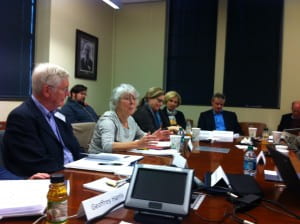On November 13-14 a group of leading historians, political scientists and practitioners from both sides of the Atlantic met at Georgia Tech to critically assess the EU’s role in promoting peace within and beyond its borders. The symposium was organized by Vicki Birchfield, John Krige, Katja Weber and Alasdair Young and was a collaboration between the Nunn School of International Affairs (particularly the Jean Monnet Center of Excellence) and the School of History and Sociology. The symposium was funded by the European Union (through the Jean Monnet Center) and B. and B. Stern Foundation. The  participants were: Desmond Dinan (George Mason University); Geoffery Harris (European Parliament Liaison Office to the U.S. Congress); Jolyon Howorth (Yale University); Piers Ludlow (London School of Economics & Political Science); Anand Menon (King’s College London); Kiran Patel (Maastricht University); Helen Wallace (British Academy); Lord William Wallace, Baron Wallace of Saltaire; and Richard Whitman (University of Kent). More than twenty others – including faculty, graduate and undergraduate students from History and Sociology, Mechanical Engineering, Modern Languages, and the Nunn School; faculty from Columbia University and Georgia State; and the French Consul General – attended parts of the discussion, which was also streamed live. The participants came from Finland, France, Germany, Ireland, Romania, Serbia, and the United Kingdom, in addition to the U.S. The public lecture by Lord William Wallace attracted an audience of more than 60 people, including the Dean of the Ivan Allen College of Liberal Arts; the Dean of the College of Sciences; and the German Consul General.
participants were: Desmond Dinan (George Mason University); Geoffery Harris (European Parliament Liaison Office to the U.S. Congress); Jolyon Howorth (Yale University); Piers Ludlow (London School of Economics & Political Science); Anand Menon (King’s College London); Kiran Patel (Maastricht University); Helen Wallace (British Academy); Lord William Wallace, Baron Wallace of Saltaire; and Richard Whitman (University of Kent). More than twenty others – including faculty, graduate and undergraduate students from History and Sociology, Mechanical Engineering, Modern Languages, and the Nunn School; faculty from Columbia University and Georgia State; and the French Consul General – attended parts of the discussion, which was also streamed live. The participants came from Finland, France, Germany, Ireland, Romania, Serbia, and the United Kingdom, in addition to the U.S. The public lecture by Lord William Wallace attracted an audience of more than 60 people, including the Dean of the Ivan Allen College of Liberal Arts; the Dean of the College of Sciences; and the German Consul General.
The motivation for the Symposium was the Nobel Peace Laureates’ Summit, which was supposed to be held in Atlanta during the week of 16 November, but which did not take place. The Symposium sought to engage critically with the reasons cited by the Norwegian Nobel Committee in granting the award to the EU. These reasons centered upon promoting peace among the original members of the integration project; fostering democracy through enlargement; and promoting reconciliation and human rights in the countries on its borders. In examining the sweep of European integration, three particular takeaways stood out. First, there has never been a clear distinction between internal and external security in the European integration project. The Cold War and relations with the U.S. profoundly shaped the origins of European integration. Conversely, European integration has, throughout its history, had implications (often unintentional) for the stability of and perceptions of threat in neighboring countries. Second, European integration has been more successful in promoting peace internally and particularly through enlargement than it has further afield. In the EU’s relations with its neighborhood and the wider world, institution building has been more pronounced than substance. In some cases, this has contributed to the tendency to pursue standard policy without due consideration for its suitability in the circumstances. Third, as the tragic events in Paris during the workshop underlined, the security situation in Europe today is profoundly different from that which prevailed when European integration started. The Cold War is over and the threat of conflict among states has receded, while new and more amorphous threats have emerged to test European integration. As Lord Wallace stressed in his plenary address, there are no easy solutions to the security challenges confronting Europe. Although the European response has been far from perfect, the EU has done “no worse” than anyone else in dealing with the immensely complex challenges poses by the disintegration of the Middle East, the resurgence of Russia and the horror of terrorism.
We plan to publish the proceedings. A recording of Lord Wallace’s lecture is available here.
